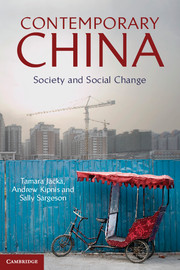Book contents
- Frontmatter
- Contents
- List of Images
- List of Maps
- List of Figures
- List of Tables
- Acknowledgments
- List of Abbreviations
- Map 0.1: China's provinces and provincial capitals
- Introduction
- Part 1 Social Institutions
- Part 2 Cultures, Socialization and the Formation of Identities
- 6 Religion, Ritual and Religiosity
- 7 Ethnicity
- 8 Education and the Cultivation of Citizens
- 9 Modernity, Youth Identities and Popular Culture
- Part 3 Inequalities, Injustices and Social Responses
- Glossary of Chinese Terms
- References
- Index
7 - Ethnicity
Published online by Cambridge University Press: 05 June 2014
- Frontmatter
- Contents
- List of Images
- List of Maps
- List of Figures
- List of Tables
- Acknowledgments
- List of Abbreviations
- Map 0.1: China's provinces and provincial capitals
- Introduction
- Part 1 Social Institutions
- Part 2 Cultures, Socialization and the Formation of Identities
- 6 Religion, Ritual and Religiosity
- 7 Ethnicity
- 8 Education and the Cultivation of Citizens
- 9 Modernity, Youth Identities and Popular Culture
- Part 3 Inequalities, Injustices and Social Responses
- Glossary of Chinese Terms
- References
- Index
Summary
The relationship between ethnic and regional identities in China is complex. Some regions of the country, even entire provinces, are politically labeled as “minority regions”, such as the “Xinjiang [provincial-level] Uyghur Autonomous Region”, or the “Diqing Autonomous Tibetan Prefecture” in Yunnan province. More important than this simple geographical overlap is a broader political question: why are some differences in language, religion, food and dress considered “regional” in China, while others are considered to be “ethnic”? The answers to this question are historical and political rather than intrinsic to particular groups of people.
This chapter focuses on the issue of ethnic difference in China. It traces the relationship of ethnic and regional categories, the historical origins of various ethnic categories, themanner in which these differences map onto present-day identities, and the way that they structure current patterns of ethnic inequality and conflict.
Regional difference and identity in China
As noted in the introduction, China has historically been constituted by wide regional differences. Different parts of the country grow different grains and consequently eat different staple foods. Regional “dialects” are as different as the languages of the countries of Europe. Strong patrilines and lineage halls are more likely to found in southern than northern China. The main styles of (non-staple) cooking in China – Sichuan food, Cantonese food, Hunanese food, Shandong food and so on – are named after provinces. Forms of traditional opera are named after the places (usually provinces) from which they originated, as are varieties of music associated with that opera. Many forms of family rituals – weddings, funerals and so on – vary depending on the place, and many villages, towns and cities have temples devoted to gods that are said to reside in that particular place and at which only local people worship.
- Type
- Chapter
- Information
- Contemporary ChinaSociety and Social Change, pp. 145 - 160Publisher: Cambridge University PressPrint publication year: 2013

